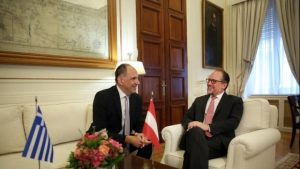The Western Balkans’ European prospect “goes through the path of law, the European acquis, democracy, minority rights, and, of course, compliance with agreed terms, including of international agreements and International Law overall,” Greek Foreign Affairs Minister George Gerapetritis said on Wednesday, after meeting with his Austrian counterpart Alexander Schallenberg, who is visiting Athens.
At a joint press conference, Gerapetritis added, “Compliance with International Law cannot be selective; acts that imply irredentist tendencies and that undermine relations of good neighborliness and the European prospect instead of strengthening them, are unacceptable, they do not contribute to the world toward the European family.”
Greece remains committed to the accession of Western Balkan states to the European Union, as set out in the Thessaloniki Agenda two decades ago. “Admittedly, there has not been a lot of progress since then, despite the efforts we are expending,” Gerapetritis noted. Greece and Austria both hope that the requirements are met in the future so those countries join the European family, he added.
Albania
As one is one of the countries promoting the accession of the Western Balkans, Greece can contribute to stability and prosperity in the region, the Greek FM said, adding that Austria’s initiative to set up the Group of Friends of the Western Balkans in June 2023 “is a great initiative.” Unfortunately, the political and state leadership of North Macedonia has committed “explicit violations in relation to the Prespa Agreement”, he added.
Gerapetritis also spoke of Albania and the continuing detention of elected mayor of Himare and MEP Fredi Beleri since May 2023, who is expected to remain in jail until October. “We expect Albania to do what is self-evident: to respect European Law, which imposes the ability of the now-elected candidate to the European Parliament to assume his duties and participate fully,” the FM said.
Another issue raised by members of the Greek ethnic minority in Albania is questions over the census process, he added.
In terms of migration, Gerapetritis noted that the migration flows from Türkiye had dropped in number since the improvement in Greek-Turkish relations, and several human traffickers have been arrested. The latter are Greece’s focus in efforts to fight irregular migration, he said, and the Greek Coast Guard follows International Law regulations during its supervision of the Greek borders, which are also European borders. “Greece is very strict about observing these rules. We are in continuous collaboration with Austrian authorities, among others,” he noted.
The FM also spoke of the need for the full and timely implementation of the new EU Pact on Migration and Asylum, the Green Aegean Interconnector linking the grids of Greece, Austria, and Germany, and of the collaboration between Greece and Austria in cultural institutions.
FM Schallenberg
On his part, Austrian FM Schallenberg said Greece is a significant country because it lies at a very sensitive geostrategic point, and a country that has helped in crises, including by helping to provide aid to Ukraine, while Greece and Cyprus are in the line of fire in the Middle East as well.
The two countries have a joint policy and want the war in the Middle East to end, he said.
Referring to the Western Balkans, Schallenber said “they are not Europe’s back yard, they are the center, the interior personal court yard of all of us, because European coutnries lie around it.” It is very important, he said, to establish the agenda for the next bodies of the next European Union. There shouldn’t be further bilateral difficulties, he underlined, adding that he expected Athens to support the proposal.
Referring to the Thessaloniki Agenda, he said old thoughts have failed and a new road map is needed in the new EU session (after the recent European elections). “We cannot wait for all these countries to cover everything,” he added.
“Politics do not love a vacuum. Either we will achieve stability and export it, or we will have insecurity that will be exported to our own countries. Either those countries will join the European acquis, or we will see alternative solutions and proposals,” the Austrian FM stressed.
On the migration issue, he said that in 2023 Greece, Cyprus, and Austria experienced the greatest burden relative to their population numbers, although Austria is not a frontlike country for migration. Austria will continue to provide funding and do a lot more to support Greece, “because your security is our security as well,” he noted, criticizing the mentality of “it is not my issue”. Greece managed to save 250,000 people at sea since 2015, and Europe must stop having ideological issues, Schallenberg declared.
Schallenberg also spoke of Greece as a beloved tourism destination for Austrians and thanked Greek authoritiesfor their collaboration, while he called on Austrians to register at the Foreign Minsiter for assistance in the case of emergencies or fires.







